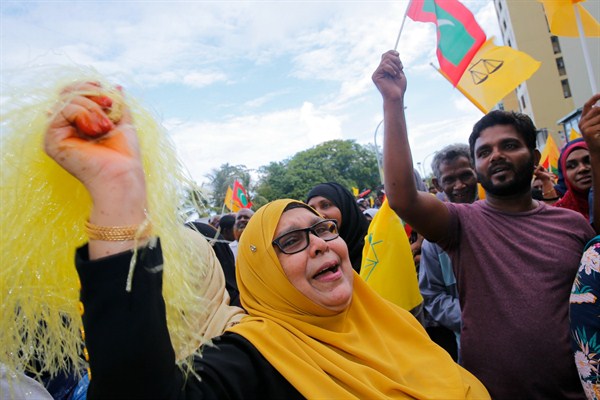The Maldives’ authoritarian president, Abdulla Yameen, began hastily burning documents at his campaign headquarters and moving boxes out of his official residence in the capital, Male, earlier this week, after being resoundingly—and astoundingly—defeated by the opposition in Sunday’s presidential election. Nearly 90 percent of voters turned out, 58 percent of them casting ballots for Ibrahim Mohamed Solih, popularly known as Ibu. Yameen was silent for the better part of a day, before conceding defeat on state television.
To say the opposition had the odds stacked against them would be a major understatement. Among Yameen’s first acts after coming to power in December 2013 was to fire and exile the independent elections commissioner, replacing him with a former secretary general of his own political party. He stacked the commission’s staff with party cronies, many of whom were seen cheering along at Yameen’s political rallies. They were regularly joined by key figures from Male’s underworld gangs, many of them widely known for taking money to attack and intimidate the government’s political opponents. Yameen, meanwhile, used his total capture of the Maldives’ rubber-stamp judiciary to not only guarantee immunity for himself and his supporters, but to jail or force into exile the entirety of the opposition leadership on the most dubious of charges.
The opposition’s first choice to challenge Yameen, former President Mohamed Nasheed, who was ousted by a coup in 2012 shortly before Yameen’s ascension, was convicted of terrorism and barred from running. Local journalists were cowed by threats, fines, disappearances and the savage murder last year of a renowned local satirist, Yameen Rasheed. Foreign reporters were effectively banned either by a hostile and convoluted new visa bureaucracy, or deported for posing as tourists, in a country widely known for its tropical beaches and honeymoon resorts.

